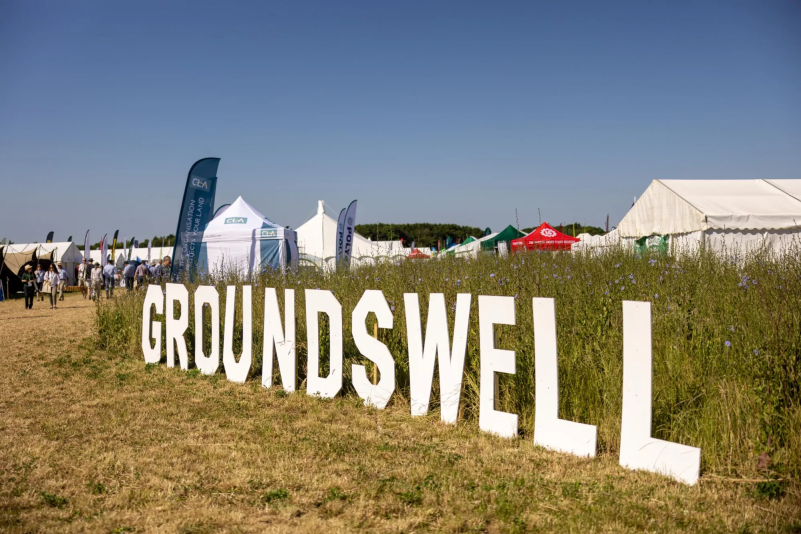Blog
Observations from Groundswell

Credit: Farmers Guide
At the start of the Summer, I attended Groundswell – the Regenerative Farming Festival at Lannock Farm in Hertfordshire. It features two days of presentations and demonstrations by farmers and businesses pioneering the transition to a regenerative system.
The festival provided helpful context to the work of the Land Use for Net Zero, Nature and People Hub. Farming organisations are active participants in the Hub and, as custodians of 70% of the UK’s land, critical stakeholders of its work, so it was invaluable to hear their perspectives, priorities and concerns – and to better understand their approach to the building and sharing of knowledge.
- Many of the speakers described how they are essentially rolling out their own, micro version of LUNZ, exploring how to achieve the transition to a resilient, economically viable future that balances the needs of their business, family and community.
- To support this process, they are carrying out research – only they rarely call it research, preferring the term ‘experiment’ or more likely ‘problem solving’ – reflecting a need to do something different where the status quo – economic or environmental – is no longer viable.
- While many of them used data to support their conclusions, much of this was reflective of observed change (e.g. bird numbers, soil texture) and figures relating to yield and productivity – and cost reduction. Some had invested in soil carbon measurement but there seemed to be less of this than previous years. While few of them referred to a ‘control’ per se – they did compare results to other aspects of the farm – or a glance at their neighbour’s field.
- The philosophy underpinning their approach is both long-term and short-term, balancing the need for immediate financial viability while planning for an uncertain future – reflecting that transition takes time, but farming is still wedded to the annual cycle of yield, overheads and profit. Unlike the government, their actions aren’t determined by a countdown to a target date (2050).
- While LUNZ aims to inform and engage policymakers, this year’s Groundswell was conspicuously policy-lite. Against the backdrop of policy uncertainty (especially awaiting news about the SFI), there was something of a ‘bunker spirit’ in evidence – a tangible sense of farmers being on their own and needing to identify and solve problems without outside support – financial or otherwise.
- The same point might be made for Green Finance – once the ‘darling’ of Groundswell, nature markets featured less prominently than in previous years, and the tents of the main businesses seemed less busy than usual. When they were referred to, it was accompanied by a clear sense of frustration at the delay in their materialising as promised.
- The bunker spirit among participants highlighted the importance of peer-to-peer learning, and the defining characteristic of Groundswell is the willingness – and enthusiasm, with which experiences are shared. I found the Q&A and 2-way feedback sessions at the end of presentations to be the most informative – and enjoyable, with a refreshing immediacy and informality. At its heart, Groundswell is a practical show aimed at anyone who wants to understand the farmer’s core asset, the soil, and make better-informed decisions.
- It is interesting to see new and growing topics of interest at Groundswell, a good example of which is the link between the health of the landscape (and the soil), plant health and human health which had real momentum this year. It was striking how many advocates of regenerative came to the movement because of the health benefits as much as the environmental ones, and where the ‘research’ on impact is even more informal, observational and personal.

Matthew Orman
Communications
Subscribe to our Newsletter
A quarterly update of all LUNZ Hub activities, events and news stories.
